Learning a New Routine
Professor Explores How Change in Relationships Can Be Affected by Economics
March 5, 2007
By Pam McLaren
When Naoko Akashi, assistant professor of economics, joined Cal State Fullerton last semester, she had to locate the classrooms where she was to teach, figure out the best places to find parking, and adjusted to meetings, procedures and paperwork. She settled in.
That’s what children do when their parents get divorced. They get used to visiting one parent, living with the other, a new place to stay perhaps, a new routine. Then, one parent remarries and there’s a stepparent to adjust to, perhaps stepsiblings….
How those changes affect a child’s academic performance is the question on Akashi’s mind.
“When adults takes on a new job, relocates or divorces, they are making a conscious decision to face new places, responsibilities and change, ” said Akashi, who earned her doctorate degree in economics from the University of Virginia. “But when a child’s parents divorce … that is something beyond the child’s control.
“Every parent wants to make the right decision, not only for themselves but also for their children’s well-being. Many sociological studies have already found that children in divorced families tend to have lower academic achievement, but it’s not clear how much of this is the pure effect of divorce,” Akashi said.
“A large part of the lower achievement of children of divorced parents may be explained by other factors, such as low income. I thought that quantifying the pure effects of divorce and remarriage on children’s well-being may help adults make optimal marital decisions,” she noted.
To test her theory, Akashi built an economic model that explains the relationship between a child’s test score and changes in his family structure.
“This is the first study that discovers that the effects of divorce and remarriage largely depend on the parents’ income level,” said the researcher. “For a mother with adequate financial resources, the negative effect of divorce on her children can be negligible. However, for a parent who earns little, a divorce has a large negative impact on the child’s academic success.
“Interestingly, even though a remarriage is predicted to improve a child’s test score on average, a remarriage that increases the family income drastically is predicted to have a negative impact on the child’s test score.
“This may be due to the possibility that a remarriage with a partner with a higher earning ability reduces the parent’s control over educational investments toward her own child.”
The effect of divorce and remarriage on children is one of three studies Akashi is currently exploring. Akashi, whose research interests are family, labor and health economics, and applied microeconomics, also is researching the economic disparities of spouses — such as someone who has no problem with having credit debt married to someone who pays cash for everything — and how families make economic decisions.
“I find the applications of economic theories to every day life to be fascinating,” said Akashi. “What we discuss in intro and intermediate economics courses may seem to have little to do with real-world applications, but I am hoping to share the fun part of economic research with as many students as I can in the future.”


